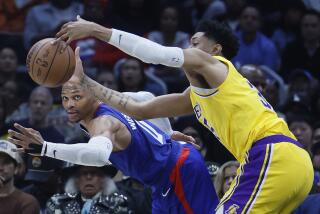Athletes: Let Time Be a Friend
You would think what happened to Jerry Rice would give pause to other athletes considering miracle comebacks.
But no.
A renowned hand specialist said Patrick Ewing might be forced to retire after undergoing major reconstructive wrist surgery.
Ewing’s response?
His wrist is feeling “better.” He is “optimistic” about his recovery. He wants to rejoin the New York Knicks “as soon as possible.”
Sure doesn’t sound like a guy facing the possible end of his career. In fact, Ewing told his teammate, John Starks, that he wants to be back for the playoffs.
Hello?
Ewing’s sense of responsibility is laudable. But Rice’s injury was a warning sign that should not be ignored.
Not everyone is Cal Ripken. Heck, at the age of 37, not even Ripken is the physical fortress he was earlier in his career.
Ewing, 35, needs to slow down, and he’s not the only one. Too many athletes think they’re indestructible. Like Icarus, too many are flying too close to the sun.
Granted, it’s difficult to criticize players who endure months of rehabilitation to overcome injuries--if anything, the ones who won’t play through pain are more deserving of scrutiny.
Still, there comes a point when ego triumphs over common sense, to no one’s benefit. It happened with Rice. It could happen again with Ewing.
Rice tried to make history of sorts by returning from major knee surgery in only 15 weeks. But he cracked the kneecap on his same leg the night he rejoined the San Francisco 49ers.
The 49ers, naturally, labeled the injury “a fluke” (Translated: Don’t blame us!). But it’s a medical fact that Rice’s knee was structurally weakened by his surgery.
So now Rice is out for the season when he could have taken an extra three weeks and returned for the playoffs.
It would be wrong to second-guess him after the fact -- his comeback initially was hailed as another example of his great work ethic and powerful will.
But it would be equally wrong to disregard the lesson of his and not register a first guess on Ewing.
Anyone can understand Ewing’s mind-set, even grasp its logic. Athletes are in better condition than ever. Sports medicine keeps improving. And today’s exorbitant salaries increase the stakes for everyone involved.
Ewing signed a four-year, $68 million contract extension last summer. He wants to earn his money. He wants to help his teammates. He wants to win an NBA title. Nothing wrong with any of that.
Indeed, it can even be argued that athletes should push the envelope, if only because they can. Eric Davis’ return from colon cancer surgery inspired millions. The risk, doctors said, was minimal.
But here’s what Dr. Robert Hotchkiss of the Hospital of Special Surgery in New York said about Ewing’s condition:
“It’s a potentially devastating injury. It’s very serious. A person with that type of injury could lose mobility to the wrist.
“It’s difficult to say (if Ewing will ever play again). ... There’s no reason not to be optimistic. But at the same time you have to be realistic.” And yet Ewing seems to believe he can return for the playoffs. “Yeah it is realistic “ Starks said. “But it will be solely up to him and how he heals. “Players can overcome a lot of things. Look at Jerry Rice. He came back even though he got hurt. He came back three months after a very serious knee injury. I expect the same thing from Patrick.”
So, Starks views Rice as a positive example. Not too encouraging. Don’t get this wrong--from Willis Reed to Kerri Strug Kirk Gibson to Mario Lemieux acts of physical courage are part of the romance of sports.
The danger is playing with injuries that are career-threatening. Rice’s teammate, Steve Young is one of several NFL quarterbacks with a history of concussions. He probably should retire. But the competitor in him fights on. It’s a fine line, deciding when to keep going and when to stop. But the spinal injury suffered by the Detroit Lions’ Reggie Brown should serve as another vivid reminder that athletes are mortal.
They say it in every sport--you gotta play hurt. It’s a reasonable enough statement. Athletes can’t always play at 100 percent. But they’re not super-human, either.
There is risk, and there is foolish risk. There is courage, and there is machismo.
If a star fails to recover from a serious injury in record time, that doesn’t make him less of a star.
More to Read
Go beyond the scoreboard
Get the latest on L.A.'s teams in the daily Sports Report newsletter.
You may occasionally receive promotional content from the Los Angeles Times.










